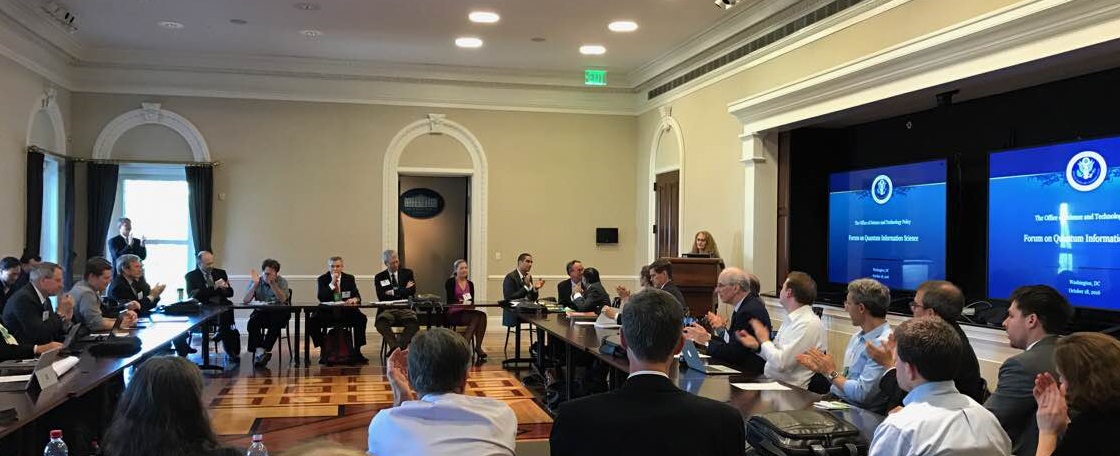
Today, the White House Office of Science and Technology Policy (OSTP) hosted a forum on Quantum Information Science (QIS) with nearly 70 thought leaders from industry, academia, national laboratories, and government agencies. Building on phenomena that are unique to quantum interactions, QIS technologies can acquire, process, and transmit information in ways that greatly exceed existing capabilities. QIS approaches promise new levels of performance for sensing and metrology, communications, simulation, and computing, enabling important scientific advances in physics, chemistry, biology, and materials science, among other domains.
The Federal Government has provided significant support for QIS research and development for decades, with a strong emphasis on fundamental research. Recent advances have solidified the scientific and technological foundations for QIS, but impediments to research and commercialization remain.

In July 2016, the National Science and Technology Council’s Subcommittee on Physical Sciences released Advancing Quantum Information Science: National Challenges and Opportunities. The report identified five categories of challenges to advancing QIS: institutional boundaries, education and workforce training, technology and knowledge transfer, materials and fabrication, and level and stability of funding. Given the strategic importance of emerging QIS applications and the rich ground for scientific inquiry, the report recommended a gradual increase in QIS R&D funding to maintain US scientific leadership and reap the societal benefits of QIS technologies. However, the report did not propose specific activities to address the first four challenges, as any solution would require the cooperation of academia and industry, nor did it make recommendations regarding private sector investment.
In the July 2016 blog post that accompanied the report, OSTP noted its intention to “engage academia, industry, and government in the upcoming months…exchange views on key needs and opportunities, and consider how to maintain vibrant and robust national ecosystems for QIS research and development.” The blog post also stated “These conversations will offer an opportunity to discuss mechanisms for addressing challenges in [QIS], including disciplinary and institutional boundaries, education and workforce training, and technology and knowledge transfer.” Today’s QIS forum represents one component of that engagement.
Accordingly, the primary goal of today’s forum was to identify strategic options for addressing the challenges impeding research or commercialization. The bulk of the workshop was devoted to two breakout sessions, where QIS thought leaders outside of government provided their individual inputs and opinions. The first breakout session was an opportunity for industry and academia to comment on the completeness and relative importance of the challenges listed in the report. The second session focused on identifying the range of strategic options and innovative approaches for addressing these challenges. These options could include policies, infrastructure, or other activities that would inspire new or expanded research or commercial activity. In particular, participants were asked which types of collaborative activities involving academia, industry, and/or government would facilitate or accelerate QIS research and engineering.
OSTP will continue to engage the broader research, development, and commercial community in the upcoming months to discuss activities in QIS, exchange information on key needs and opportunities, and consider how best to nurture a vibrant ecosystem that supports and facilitates progress in quantum information science.
Altaf H. (Tof) Carim is Assistant Director for Research Infrastructure at the White House Office of Science and Technology Policy.
William T. (Tim) Polk is Assistant Director for Cybersecurity at the White House Office of Science and Technology Policy.

